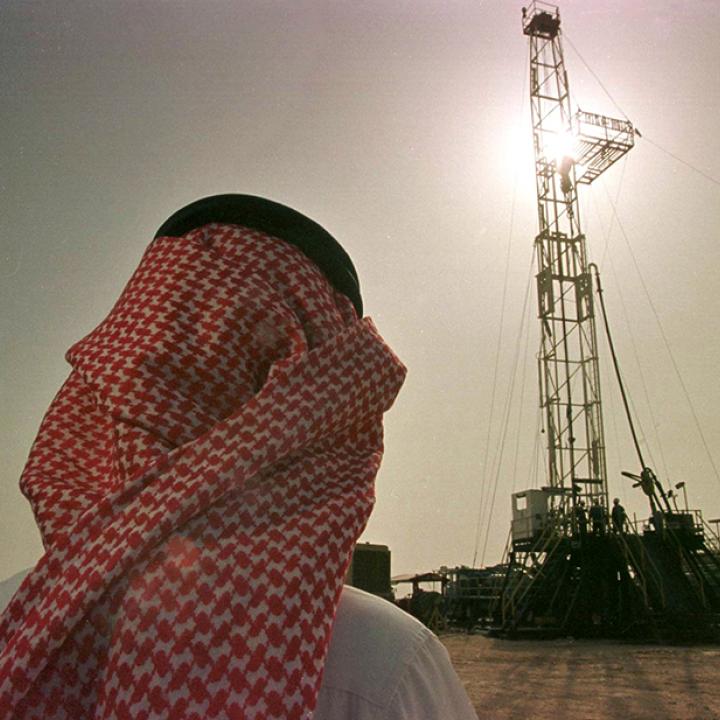
- Policy Analysis
- Policy Alert
Saudi Arabia's Challenging Plan to Shift from Oil

The success of Riyadh's new economic policy will partly depend on changes in social and political attitudes, as well as greater transparency on legal and other issues.
In 1984, a British ambassador departing Saudi Arabia at the end of his tour wrote a "valedictory telegram" defining the kingdom in terms of three "I's" -- Islam, insularity, and incompetence. Unsurprisingly, the telegram was promptly leaked. Islam is certainly still the country's dominant feature, but the Internet and social media mean that at least the younger generation is well aware of what is going on in the wider world, even if the population remains generally conservative and insular. As for incompetence, it is now less well hidden -- most recently, the minister of water and electricity was fired on April 23 for poor performance.
Against this backdrop, Riyadh announced a new economic plan on April 25 called "Vision 2030." Promptly approved by the Council of Ministers, the plan is the brainchild of Deputy Crown Prince Muhammad bin Salman (aka MbS), the thirty-year-old royal who is increasingly seen as representing the aspirations of the emerging generation. His campaign to implement Vision 2030 will be helped by the fact that he is regarded as the most powerful person in the kingdom -- a consequence of being the favorite son of the ailing King Salman, even though his older cousin, Crown Prince Muhammad bin Nayef, is theoretically above him.
The main challenges, arguably, will be legal. Tantalizingly, MbS wants to attract foreign investment in the national oil company, Saudi Aramco, and build up the world's largest sovereign wealth fund, valued at up to $3 trillion. But the business success of neighboring states such as Abu Dhabi, Dubai, and Qatar is grounded in providing foreign investors with a system for resolving commercial disputes based on common law and foreign arbitration, rather than the Islamic law that dominates life in the kingdom.
Two political challenges loom as well. First, a key beneficiary of Vision 2030 will be the Saudi business and technocratic class, which thirsts for commercial opportunities. But the royal family has to balance the business elite's influence against the power of the Ulama, the clerical body that grants vital religious legitimacy to the House of Saud. Second, within the royal family, which traditionally works on consensus, MbS is believed to have less than total support. Some princes regard him as impetuous and inexperienced, and many are likely concerned that they will lose their privilege of securing favorable terms on business deals -- a traditional way for royals to accrue wealth, but also a source of resentment among non-royals.
Economically, the plan seems contradictory in relying on partial privatization of Saudi Aramco to fund a shift away from oil dependency. The kingdom has more than 15 percent of the world's proven oil reserves, second only to Venezuela, which has much higher production costs. As much as 70 percent of the Saudi economy is currently linked to oil.
To attract foreign investors, the kingdom will also need to be much more transparent about the information it releases. Official statistics are often limited and sometimes unbelievable. For example, government data indicates that two-thirds of the country's 30 million residents are Saudi and one-third expatriate, but some experts believe the proportion is exactly the reverse, undermining the validity of Riyadh's stated plans for housing and educational needs.
Fundamentally, Vision 2030 represents an opening up of Saudi Arabia -- not only to foreign investment, but also to world opinion, much of which regards the kingdom's ban on women driving, its public beheadings, its state-mandated floggings, and other practices as reprehensible. Some of the potential investors Riyadh seems to covet most, particularly in the West, might be deterred by this problematic human rights record. These concerns also formed part of the conversation that President Obama had with King Salman, MbS, and other senior princes during his visit to the kingdom last week, yet the royals countered by noting that such punishments are Islamic. The disagreement is a reminder that Saudi Arabia, home to Mecca and Medina, still sees itself as the leader of the Muslim world.
Vision 2030 represents a Saudi plan for economic leadership in a world where oil is no longer dominant. If it succeeds, it will also bring about much broader changes within the kingdom.
Simon Henderson is the Baker Fellow and director of the Gulf and Energy Policy Program at The Washington Institute.

